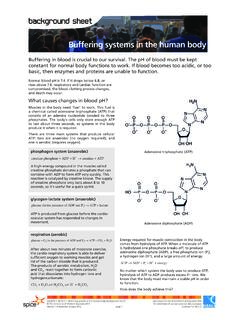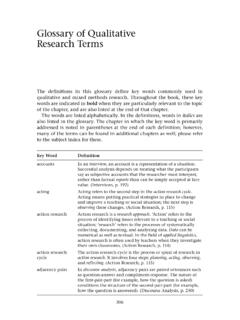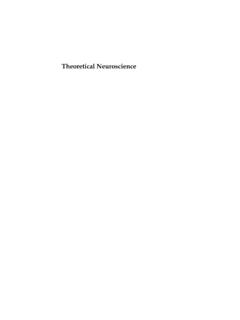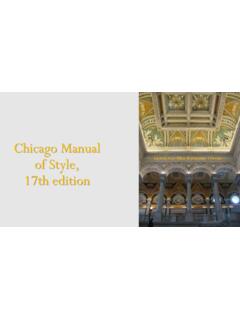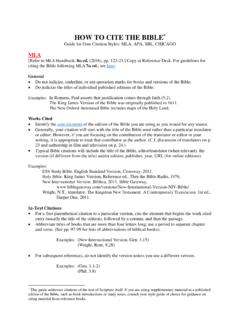Transcription of Methods and Methodology - University of Western Australia
1 STUDYS marter SurvivalGuide Methods AND Methodology What is the difference between Methods and Methodology ? Methods are the specific approach to collecting your data. This could include: Interviews Surveys Focus groups Experiments Case studies Observational studies Online data collectionEvery method varies in style, so it is important that you research these before applying them. For example, an interview could be structured or semi-structured. A survey could be multiple choice or long answer questions. Methodology is the theoretical framework to support the Methods chosen. It is a perspective taken on the research, which dictates how it is approached. Examples of this are: Phenomenology Phenomenologyprovides us with interpretations regardingthe distinctions between the internal andexternal world as well as levels ofobjectivity and subjectivity.
2 1 Critical Theory strands of critical theoryexist in terms of criticism of occidentalcomplacency and that ruling elites andideologies should be challenged as wellas greater equality and liberty sought. 1 Ethnography research is undertaken inthe field and attempts to capture andunderstand social action and the meaningof this action. The researcher is not basedin a constructed setting or experiment butpart of the everyday natural situationwithin which those under investigation (orthose involved with research project)exist. 1 How are Methods chosen? Every discipline uses different Methods for research. For example, a study on stressed students could be examined through focus groups in the Humanities or by tracking heartrates in the Sciences. Each of these are valid, but would generate different data. Sometimes a mix of Methods can be used. When selecting Methods , you should: do a literature review of similar studies, read about Methods & Methodology , and speak to your collecting data ask yourself: Do you have access to the people/resources needed?
3 Is there a high risk level? Can you rationalise the risk level? Have you got ethics approval? Does it fit your budget and timeline? Will it create reliable data? How can you compare your data? How are you recruiting participants? Have you created consent forms?Remember: Your Methods are a part of your entire research project, so it is important that you plan them well from the start. PLAN COLLECT EVALUATE ANALYSE WRITE Research 4 ~ What other key terms are important? Ontology conceptualisations of realityor truth. 1 How can we gain knowledge ofsomething that has yet to be proven toexist? Epistemology the relationshipbetween the observer and observed. 1 How involved is the investigator? Are theresults objective or subjective?
4 Quantitative This research approach isabout gaining a high collection of data toensure accuracy. It is often statisticallybased. Surveys are an example of this. Qualitative This research entails example, interviewing 20 people,rather than surveying 200 people, allowsparticipants to explain their Tips Surveys should be simplified for easy comparison across answers. Do not combine too many different types of questions ( ranking 1 to 10, ranking highly likely to highly unlikely, multiple choice, long ) Surveys vary in length. 10 to 30 questions are suitable. However, it depends on where and how they are doing the survey ( street surveys will need less questions). Participants should be able to skip questions that are not relevant to them. Research various online survey platforms that will help to collate the data. Test out the survey on peers before official use. You want to make sure the questions are clear and there are no technical glitches.
5 Focus Group Tips Sometimes people become shy in a group. Try to make them feel comfortable. Start with simple questions and get to know them a bit. Set out clear objectives. Recruit suitable people. Do a pilot study first, then refine it and repeat. Maintain control of the group. If they start to go off track, bring the discussion back to your question. Avoid leading questions, make sure you word them appropriately. Do not assume you understand what a participant is saying; ask them to elaborate. Interview Tips Have consistent questions that can be easily compared across interviews. Always start with a basic question to make the interviewee feel at ease. Be able to adapt your interviews for in-person, email, Skype, phone etc. Do not ask double questions. Keep your questions short and simple. Have 10 main interview questions and 10 spare. Some interviewees will talk a lot and you will run out of time, so questions must be prioritised.
6 Other interviewees are very succinct, so you do not want the interview to end too quickly. Allow the option for your interviewee to go on tangents, but not for too long. Get approval for recording interviews. This will help for accurate transcribing. Look into transcribing programs. 1. Howell, 2013, An introduction to the philosophy of Methodology , SAGE Publications Ltd, London,[Accessed 6 November 2018], doi: this Survival Guide? Why not check out more of our writing a Literature Review, writing a Research Proposal, writing an annotated bibliography , writing a Research Abstract, writing a Paragraph, writing Thesis Statements, and Quoting and Paraphrasing. Want to know more about STUDYS marter? Find out abo ut all our services and resources at: Any suggestions? We would love to hear from you. Email us at This resource was developed by the STUDYS marter team for UWA students. When using our resources, please retain them in their original form with both the STUDYS marter heading and the UWA logo.
7




